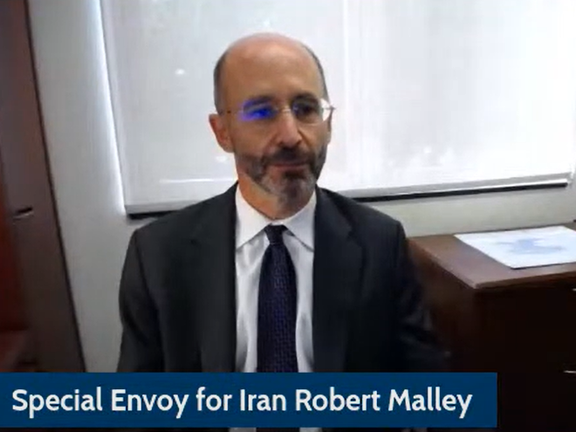US Envoy Defends Nuclear Deal, Questions Tehran’s Realism

Rob Malley, the US special envoy for Iran, said Wednesday there had been “too much focus on the date” for resuming the Vienna nuclear talks with Tehran.

Rob Malley, the US special envoy for Iran, said Wednesday there had been “too much focus on the date” for resuming the Vienna nuclear talks with Tehran.
Malley said that the real issue was whether Iran had “a realistic view on how to come back into compliance with the deal.” Malley's statement about too much focus on the date for resumption of the talks comes as both top US officials, such as Secretary of State Antony Blinken, and European powers have in recent weeks emphasized that time is running out.
At the same time, he also used a tougher tone, reiterating that the US is ready to consider “all options” if Iran were not willing to return to the constraints of the 2015 nuclear deal.
Vienna talks between Iran and world powers, which began in April, was initially suspended since June pending transition to a new administration in Tehran after presidential election won by Ebrahim Raisi (Raeesi). But more than two months after the hardliner took office Tehran has not announced when it would return to Vienna.
In an interview with the Carnegie Endowment for International Peace, Malley stressed the benefits of reviving the 2015 deal − the JCPOA, Joint Comprehensive Plan of Action − while extolling the Biden administration’s cooperation with Israel and the Arab Gulf states, who opposed the deal.
Malley called the decision of former president Donald Trump to leave the JCPOA in 2018 “catastrophic.” He said that Iran’s steps in expanding its nuclear program since 2019 were ones “you could all reverse,” even if expansion would at some point be “irreversible.”
Calm things down
The envoy said a possible “longer and stronger” agreement with Iran could follow a revived JCPOA: “They [Iran] would like to get something more than the JCPOA…The best way forward is to get back to the JCPOA and then discuss ways of strengthening it and dealing with issues that remain very divisive between Iran and the United States. We think this would be to our mutual benefit, there are still things that Iran still wants in terms of sanctions and things that we still want…Let’s get back to the JCPOA to calm things down.”
Rather than expressing any toughening of the US position Malley said the Vienna talks accepted the JCPOA focus on Tehran’s atomic program: “That remains the equation, the equilibrium that remains on the table.”
The critics of the Biden administration’s Iran policy say that if the JCPOA is restored, without additional agreements and sanctions are lifted, Iran would have little incentive to discuss more restrictions on its nuclear, ballistic missiles or regional policies. Most JCPOA limits on Tehran’s nuclear activities will expire in a few years and then it could pursue a much expansive program.
Malley also said that the fate of four Americans jailed in Iran was “separate and apart” from the nuclear talks, on a “separate track.”
Discussions with Iran over the detainees were indirect, the envoy said, just like US participation in Vienna, where talks are based on JCPOA structures, which the US left under Trump. Malley conceded he found this frustrating.
“The Iranian refused direct communications, direct contact with us…[which] lends itself to misunderstandings, to delays…the negotiations would have been more effective had we been able to talk to the Iranians directly.”
But Malley insisted the Biden administration had offered confidence-building measures, and that all parties − Europe, Russia, China “and the Iranian negotiators themselves” – acknowledged “real progress” in Vienna. Malley said Washington continued to tell China that a revived JCPOA would help stabilize a region from which Beijing imported most of its oil.
A different path
Malley said it remained to be seen what path would be taken by a new Iranian administration “clearly stating that it wants to do things differently … [and] every day is making statements about how little was achieved” in Vienna.
“The Biden administration put on the table ideas which meant if Iran had negotiated, and reached this understanding, then sanctions…inconsistent with the JCPOA would have been lifted, and lifted very quickly,” he said. “That’s the choice Iran faces today: are they prepared to go back, or do they want to choose a different path?”
Malley said that close coordination with Israel and the Arab Gulf states − with the Saudi, Israeli and Emirati foreign ministers currently in Washington – recognized their “real reservations about the nuclear deal” and that Trump’s withdrawal had been “celebrated quite strongly in Israel.”
But Malley suggested that four rounds of Saudi-Iran talks and a “lively debate in Israel” were both positive developments.
“We will be prepared to adjust to a different reality in which we have to deal with all options to address Iran's nuclear program if it's not prepared to come back into the constraints [of the JCPOA],” he said.